Related Content
Content
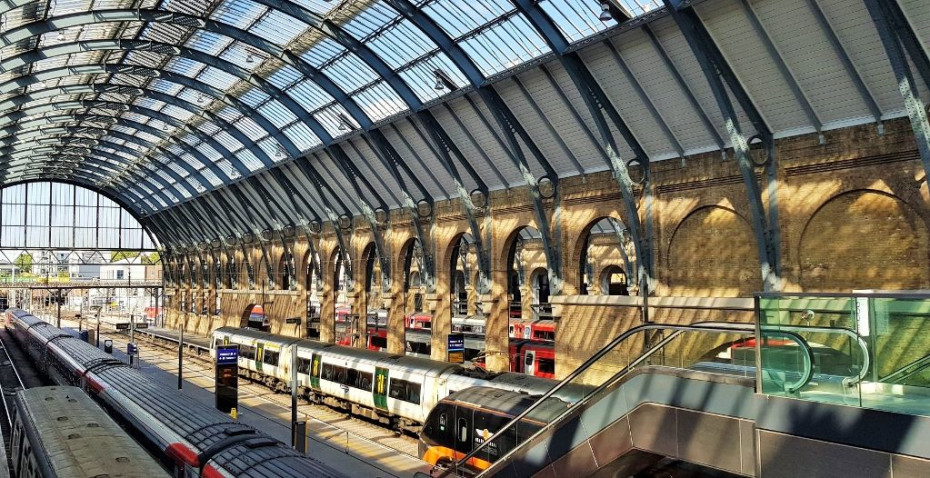
Six Reasons to Travel on British trains
Discover why on a typical day there's actually a lot to appreciate about travelling in Britain by train
Share
Taking a journey by train in Britain can inevitably on occasion be less than perfect and yes the walk up ticket prices for journeys at peak times on weekdays can be extortionate,
When the timetable is operating as it should, many day-to-day aspects of travelling around Great Britain by train can be compared very favorably with how railways are typically operated in mainland Europe.
And yes those closures for works on the railways around public holidays are annoying, but this work, which is largely due to the delivery of future service improvements, occurs in every other European country too.
Having taken more than 800 long-distance (two hours plus) and commuted to/from central London for more than 20 years, I've experienced delays in excess of an hour on no more than around 15 occasions.
The reasons for these delays; weather of various kinds, trespassers on the railway, equipment failures and a lack of available staff, have all also delayed some of the journeys I've taken on the continent.
To the best of my knowledge I have never been severely delayed because a member of railway staff just couldn't be bothered to do their job properly.
On holidays in recent years the staff on trains and in booking offices and stations have delivered exceptional customer service in multiple locations including Edinburgh, Glasgow, Leeds, Machynlleth, Manchester, Penzance, Stirling and York.
On some recent multi-destination holidays, my mum who is a fabulous 78 years young, came along.
The lifts and escalators which have been installed at a swathe of stations including Dundee, Glasgow Queen St, Huddersfield, London Bridge and Penrith, plus the mobile-friendly facilities on many of the trains that were taken, all contributed to her declaring the experiences as "fabulous"!
1 - Spend less time waiting for a train:
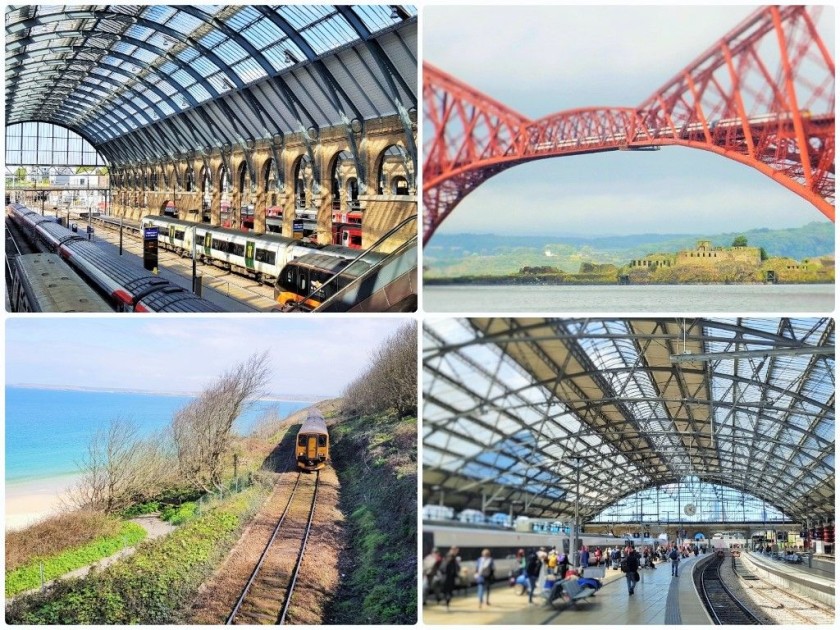
Great Britain has the most frequent long-distance train services in Europe.
On the continent very few express train routes have more than one train per hour, with only the high speed line between Milano and Roma excelling the number of departures found on the UK’s busiest routes.
Many Belgian and Dutch intercity routes have two trains per hour, but those routes are inevitably shorter than those taken by the, as frequent, British train services.
When the usual timetable is operating the fastest routes between London and both Birmingham and Manchester have three trains per hour, while Manchester ↔ Leeds has four or five.
A minimum of two trains per hour already connected London with a swathe of other distant towns and cities including Bristol, Cardiff, Leeds and Norwich, but in recent years Edinburgh was added to that list, thanks to the most intensive rail service ever provided between the two capitals.
More Frequent Services Than Ever Before
Numerous other additions to the pre-pandemic timetables, which will hopefully be restored to full service in 2023, included a doubling of the services between Manchester and Scotland, a new direct link between Glasgow and Liverpool, a new service which doubled the frequency between Edinburgh and Leeds and the Edinburgh <> York service joined that four trains per hour roll of honour!
A long list of some of England’s most beautiful towns and cities including Cheltenham, Gloucester, Exeter, Harrogate and Lincoln were also newly provided with their most frequent ever rail connections with London.
2 - The masses of brand new and improved trains:
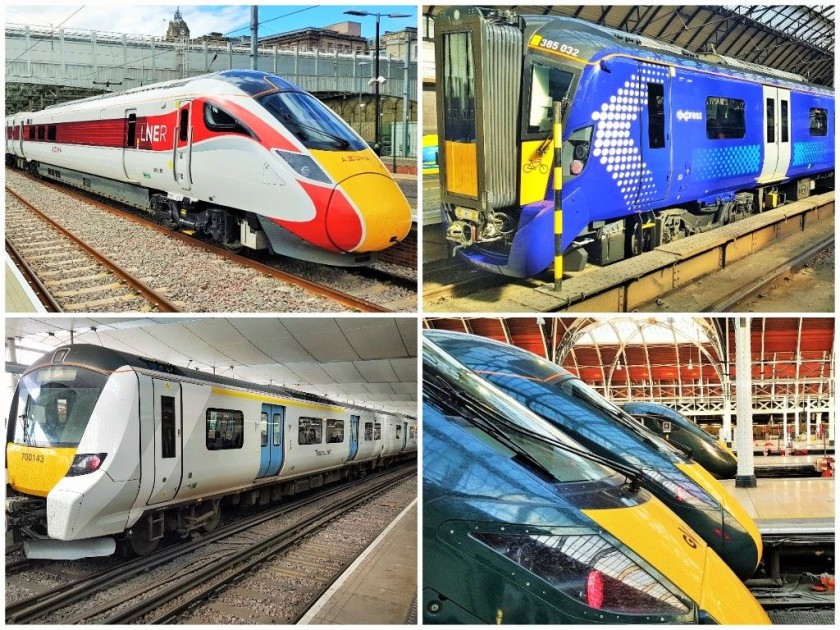
The volume of new trains being introduced across the continent, with improved on board info, along with better facilities for passengers requiring mobility services and more bike storage, is contributing to the golden era of rail travel.
Though it's highly likely (I don't have access to all the data) that the percentage of new trains placed in service in Britain over the passed three years exceeds that in any other European country.
On these popular journeys to British destinations from London, new trains are being used on 50% of these routes.
It's not only the capital which is benefitting from this bonanza, on similarly popular routes from Manchester it is 45%, from Edinburgh = 35% and from Glasgow = 45% and on many of the other Scottish routes, the recently refurbished iconic 125 trains have transformed travel for the better.
The expansion of the the UK train service has been enabled by fleets of brand new trains which have been introduced across the country in the past three years.
Azuma trains now link London to Aberdeen, Edinburgh, Inverness, Leeds, Lincoln, Newcastle and York.
Intercity Express trains connect the capital, to Bath, Bristol, Cheltenham, Devon, Cornwall, Hereford and South Wales.
Nova trains introduced earlier this year, now provide those expanded services between Leeds, Liverpool, Manchester and Scotland.
As hinted above Rail travel in Scotland has entered a new era with new electric trains provided between Glasgow and a swathe of other destinations including Ayr, Wemyss Bay, Edinburgh and Stirling.
And across northern England the rightly maligned Pacers have banished into the history books by fleets of very smart new trains.
Brand new trains have also been introduced on the London <> Norwich route and on other routes in Norfolk and Suffolk.
And British overnight trains are now some of the best in Europe thanks to the transformation of the Caledonian Sleeper
3 - Transformed stations:
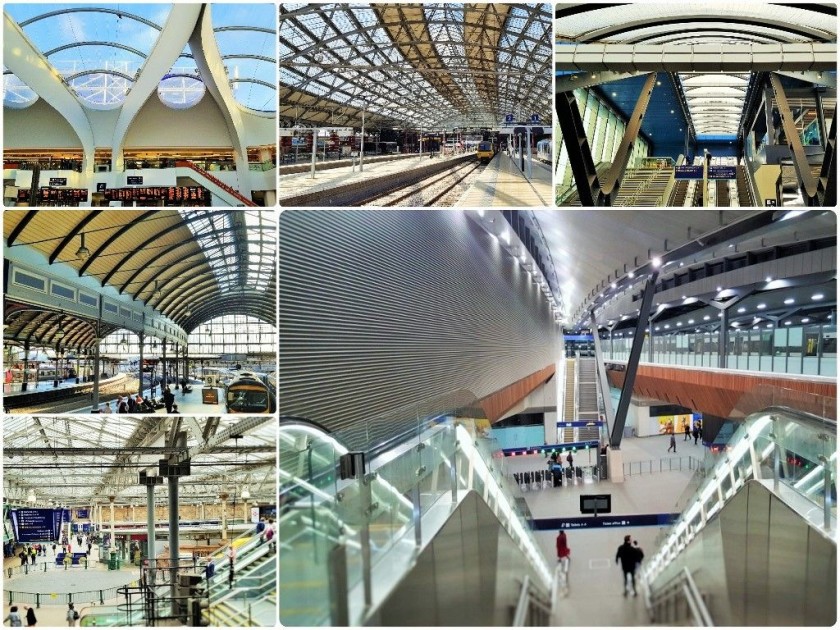
These new trains are also arriving and departing at stations which have been recently transformed.
The likes of Birmingham New Street, Glasgow Queen Street, London Bridge, London Kings Cross and Reading have been completely made over and a swathe of other stations including Edinburgh Waverley, Glasgow Central, Liverpool Lime Street, London Paddington, Manchester Piccadilly, Newcastle and York have never looked smarter.
But these station improvements are more than just aesthetic as the primary objective is to make them easier to use than ever before.
4 - The multitude of beautiful journeys:
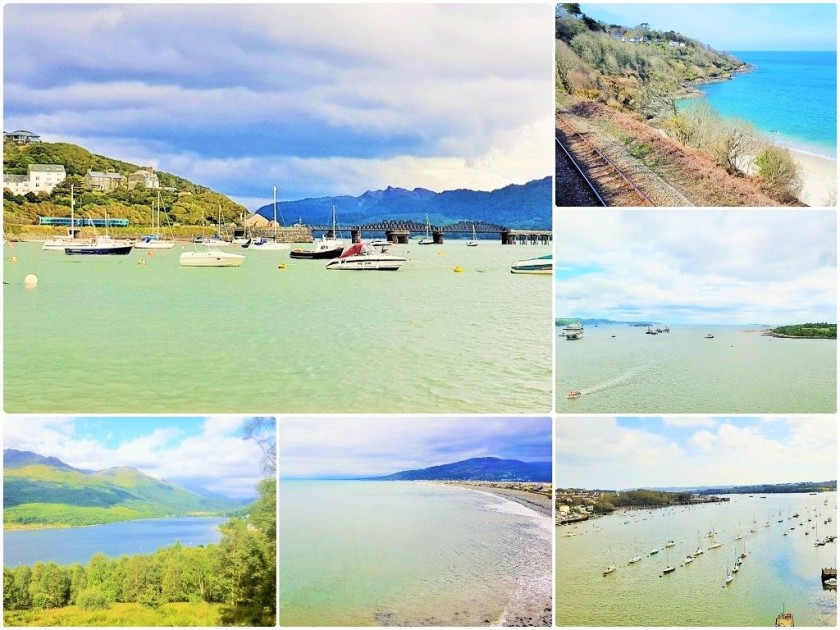
What hasn’t inevitably changed is the fantastic scenery that can be appreciated on many British railway routes.
Something which can be a tad under-valued, as one has to travel a fairly long-distance from London to be awed by seeing a landscape from a train window, but the final halves of journeys from the capital to Penzance, Glasgow, Edinburgh and beyond into Scotland are fabulous.
Pretty much any long-distance train journey in Scotland and Wales is wonderful, with the English route across the Pennines between Leeds and Carlisle providing similar aesthetic thrills.
Though what is exceptional about British rail travel is its unheralded plethora of coastal train journeys
These routes are just some of those with exceptional sea views:
Newcastle ↔ Aberdeen
Glasgow ↔ Tarbet on the West Highland Line
Machynlleth ↔ Pwhelli on the Cambrian Coast Line
St Erth ↔ St Ives
Exeter ↔ Newton Abbot
Inverness ↔ Helmsdale on the Far North Line
Invernesss ↔ Kyle of Lochalsh
Fort William ↔ Mallaig
Lancaster ↔ Workington
5 - Food glorious food:
Here's a fact that some UK citizens may find hard to swallow, but the availability of on-train catering on British trains can be comparatively exceptional.
Because of the different approaches to on-board services by each train operating company, that is something of a sweeping statement, as it is possible to travel for long-distance on some British train routes without any access to catering.
But the same can be said of train travel in general across Western Europe, one of the many quirks of European train travel is that the traditional concept of a restaurant car on a train service is more common in eastern Europe.
Whether you are travelling in Standard (second) or First Class, you're more likely to be able to make use of an seat catering trolley service in Britain than in Belgium, France, Italy, Switzerland or The Netherlands,
But if you will be travelling First Class on a long-distance train, particularly to and from London, then the on-board catering is in a league of its own.
Because if you make such a journey when travelling with Avanti West Coast, GWR or LNER, the food you will be served at your seat, is complimentary, it is included within the ticket price.
This food offering is often a complimentary hot meal; and on weekdays EMR serves its First Class travellers a complimentary hot breakfast.
The train services to and from London on which 'first class' ticket purchasers receive complimentary catering includes Eurostar, as its included when booking Standard Premier tickets.
Yes these hot meals are factored into these operator's ticket costs, but this complimentary at-seat hot food service, that's available to regular first class ticket holders and users of first class passes is only found on one other European European train service, namely the IEP trains in Poland.
So it is much more common in Britain than anywhere else.
Hot meals served at first class seats on other European train services such as AVEs and Thalys are only available when buying tickets a grade above first class.
6 - The opportunity to wallow in nostalgia:
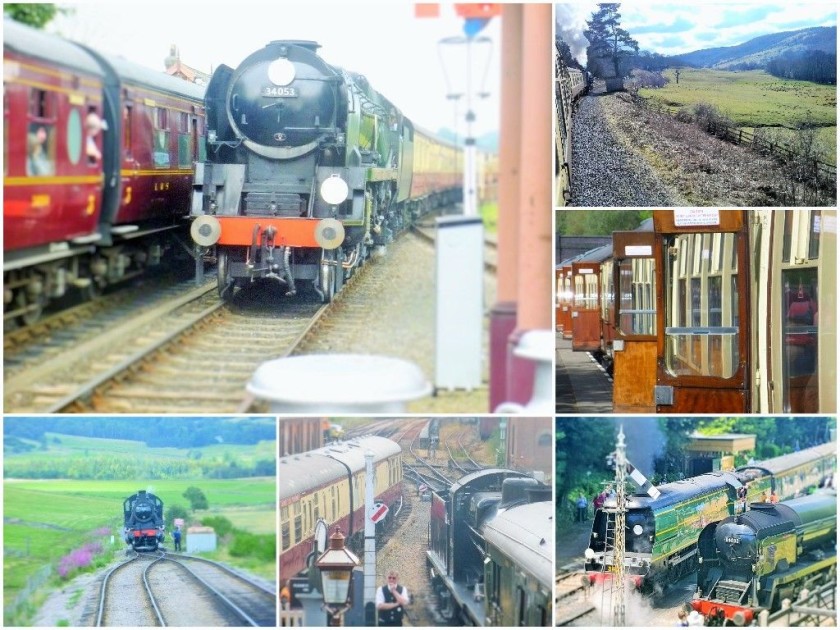
One other aspect of British train travel that no other European country can match, is the fantastic number of preserved railways still operated by steam trains.
It’s possible to take a contemporary train to numerous stations across the country including Alton, Aviemore, Blaenau Ffestiniog, Bodmin Parkway, East Grinstead, Keighley, Kidderminster and Sherringham in order to take a ride or two on a steam train.
...and some aspects of British train tickets have unique benefits
What can get overlooked in the eternal ‘British train tickets are a rip-off debates’ is that the very high prices for booking a last minute long-distance journey, are very much the exception to the rule.
Book a shorter-distance journey at the station or from a train conductor and the staff will ensure that you’re travelling at the cheapest possible price, so should automatically include any savings for travelling as a family or in a group.
An undeniable and comprehensively over-looked positive of dividing the provision of UK train services between multiple companies, is that these operators are able to manage their own long-term promotions, tailor-made to the routes they operate, such as Southeastern's 'Kids For A Quid' offer.
Seven other largely unheralded positives around UK train tickets, compared to what can be the norm in other European countries, are:
- Day Return tickets being available at off-peak times, which cost little more than single tickets, but allow for a two-way journey.
Meaning that taking day trips by train can be particularly cost effective in Britain. - Great Britain is the only European country where no payment is required for optional seat reservations, which is a particularly big win for rail pass users.
- And this is super-convenient for anyone who wants to take advantage of the the fact that Britain offers more regional rover/pass tickets than anywhere else in Europe, which can be put to good use exploring many of Britain’s most scenic locations.
- And what also makes using these rovers and many general tickets much simpler, is that on many shorter distance routes, Britain avoids the complication of tickets only being valid on certain types of train.
To travel between Germany cities on an ICE train, you need a ticket valid for the ICE and similar 'rules' apply in Czechia, France, Italy, Spain, Sweden, Switzerland etc.
But when not using Advance tickets on many British journeys, you can often hop on the faster train regardless. - No tickets are required for taking bikes on board.
- No tickets are required for dogs.
- And the upper age limit of 15 and under for child tickets, is higher than the likes of Belgium, France, Italy, Spain and The Netherlands.
Also a comparatively high number of types of Railcard, which then give discounts on ticket prices, are also available for journeys by train in Britain.
Though ticketing reforms are needed:
The lack of consistency around booking tickets, often being due to which train operating company just happens to be providing the service that you will be travelling by isn't ideal. Particularly as travellers only have a meaningful choice of operators and therefore prices, on a comparatively small percentage of routes.
Though ShowMeTheJourney can help with that thanks to the guide as to which company operates trains on each route, with a focus on those most likely to be taken for leisure purposes.
And yes there’s no disguising that the volume of companies providing the train services can often complicate how train tickets are sold, hence the original guide to how save money when booking British train tickets being a tad epic.
And then the shortened version ended up also being longer than intended!
They’re particularly worth diving into if you’ll be travelling long-distance and attempting to do anything trickier than booking ahead for a long-distance journey by direct train.
Though two things which would of greater benefit to the travelling public than anything else mentioned in this article are:
-
When more than one company will be providing the trains required to complete a route, discounted Advance tickets should be made available for the entire end-to-end journey, to get rid of what is often in effect a cost penalty for having to change trains
Innovations around split-ticketing in these circumstances can provide a highly useful service, but there shouldn't be any need for them at all. -
A max price per mile could, but won't ever be introduced; thereby getting rid of the ludicrously high prices for walk-up long-distance trains at peak times on weekdays.
Does the volume of tickets sold at prices which exceed £200 justify the negative perception around ticket prices in general, which permeates the UK media, with the headline highest possible price virtually guaranteed to be posted as a reader's comment on any train travel article.
The percentage of travellers paying these prices is likely to be tiny, but because they exist, they can be used as weapon to justify criticism of rail travel in general, which seems to be blatantly counter-productive.
Though something which hasn't had enough attention, because it's a positive step, is that the booking periods required for booking cheaper Advance tickets have been significantly decreased.
For journeys by the trains operated by many companies it has come down to an hour or less, meaning that it's often possible to obtain a cheaper Advance ticket just before setting off for the station.
Please support ShowMeTheJourney
This second version of ShowMeTheJourney is exciting and new, so we are genuinely thrilled that you are here and reading this, but we also need your help.
We’re striving not to let anything get in the way of providing the most useful service possible, hence a facility has been set up with DonorBox which can be used to support the running costs and make improvements.
Instead of advertising or paywalls, your financial support will make a positive difference to delivering an enhanced service, as there’s a lot of ideas which we want to make happen.
So if you have found the info provided here to be useful, please go here to say thank you.

Simon Harper
I wanted to share my passion for train travel and explain how anyone can take the fantastic journeys I have taken.

This is one of more than 100 train travel guides available on ShowMeTheJourney, which will make it easier to take the train journeys you want or need to make. As always, all images were captured on trips taken by ShowMeTheJourney.
This second version of ShowMeTheJourney is exciting and new, so we are genuinely thrilled that you are here and reading this, but we also need your help.
We’re striving not to let anything get in the way of providing the most useful service possible, hence a facility has been set up with DonorBox which can be used to support the running costs and make improvements.
Instead of advertising or paywalls, your financial support will make a positive difference to delivering an enhanced service, as there’s a lot of ideas which we want to make happen.
So if you have found the info provided here to be useful, please consider saying thank you.








